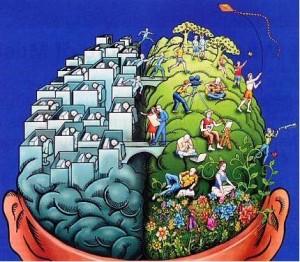How your mind can make you fat
While your mind can be your biggest ally in your struggle to lose weight, it can also sabotage your efforts in ways you might not even know about. It can be quietly working in the background subconsciously, undoing all the good you do consciously. There are a lot of physiological and psychological factors that make us want to eat, and understanding these, and learning how to counteract them are paramount to losing weight.
Before you try any diet, consider the following:
- Your body is designed to process food efficiently. That means that your body naturally regulates your metabolism to be quick when you have a lot of food, and slow when you don’t have as much.
- No amount of willpower will make you not want fatty and refined foods. The mind is hardwired by evolution to want these things, because they translate into easy, quick energy. Celery, on the other hand, requires a lot more work for the body to get nutrients from.
- It’s common to resist physical activity. The mind is telling you not to work out, because it means you will be using up energy to no purpose. Your brain is trying to tell you to save that energy in case you need to hunt, or run from a predator.
- Cleanse and Flush diets aren’t doing anything that your body is not doing already. We have a liver, kidneys, and a pancreas to flush out toxins for us.
- The mind closely associates food with comfort, because plentiful food is an indicator of security. It’s common to eat food in order to feel safe and comfortable.
Your mind also tends to trick you into eating with hormones and chemicals. A diet high in fatty and highly processed foods works in much the same way a drug might. An injection of, for example, highly refined flours and sugars in a piece of cake will cause your blood sugar to spike, and will also cause a release of Dopamine, which your body translates as a small high. When you come down from that high, you become depressed, which will cause you to want to eat more fatty processed foods in order to get that feeling again. To fight this kind of cycle, willpower alone just won’t cut it. Find a way to remove yourself from these situations. Don’t keep these foods at home, or make it difficult to go get them (for example, by parking your bike behind you car, so that going out to grab fast food will require moving it, or just taking the bike.) You can also fight this by keeping yourself distracted in an activity, like playing a video game, or working on a hobby project.
The mind can tempt you to eat when you don’t need to in several ways. One of the biggest self-defeating culprits is rationalization. It’s that voice in your head that says, “This one piece of candy won’t hurt; you’ve been working out so regularly!” or “Go ahead and have that extra serving of dinner…you did an extra half mile on the treadmill this morning!” And the worst part of rationalization is, that it usually works. Your mind is making you fat, and you don’t even know it.
One way to avoid the rationalization pitfalls (and the guilt that usually accompanies it) is to set more realistic goals for yourself. If you’ve put yourself on a strict diet and exercise regime, for instance, go ahead and build in a few rewards for yourself. Having a predetermined reward as a goal to shoot for sets your mind up to build up towards the end game, to not have to “cheat” to get what it wants anyway. Say you’re on the treadmill for an hour a day, with a limited calorie diet to look forward to every day for the next few months. Try working in a day a month where you get to go off-diet, even just a little, as a reward for the consistent effort you have put in all the other days. If your mind doesn’t feel like it’s cheating, you’ll avoid the guilt that might also be making you fat. Guilty eating as a result of bad work/rewards ratios is as difficult a problem to overcome as the overeating in general. No matter what is at work in your brain putting food in your mouth that is not healthy for you or is making you fat, you can counteract the effects by making more positive decisions on goal-making.
Another hurdle to fairly easily overcome is that of “self-talk.” That’s where you tell yourself negative things like, “You’ll never lose the weight; you’re too fat” or “You can’t do this because you’re worthless.” The mind trick here is to stop the talk in its tracks. If you hear negative talking in your head, you say to yourself, “I would not let a stranger say these things to me, therefore, I do not have permission to say them to myself.” It is positive reinforcement towards your self-image that can play an important role in not only helping you to keep working at your weight loss, but at life in general. A positive mental attitude will help with your confidence and ability to make more healthy decisions for you. If you think that you deserve to feel better and look better, then your chances of making exactly that happen are greatly improved.
Remember, forgive yourself for mistakes, set more realistic goals and don’t let your mind sabotage your good intentions.

























